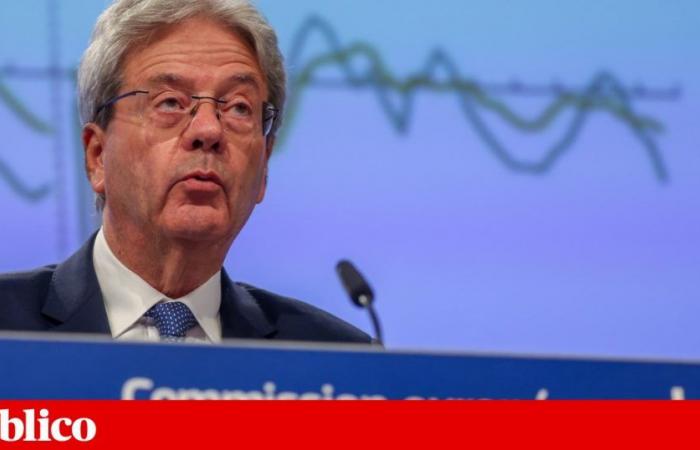In the midst of a darker situation than expected for the European economy, the European Commission kept its growth forecasts for Portugal practically unchanged, pointing to a slowdown in the pace of economic activity throughout this year and a modest acceleration throughout 2025.
In the interim winter forecasts released this Thursday, the European executive does not make, in relation to Portugal, more than small corrections in relation to the autumn forecasts that it had presented in the middle of last November. If economic growth last year, which was previously estimated at 2.2%, ended up being 2.3%, with regard to the performance of the economy during this year, the Commission is now more pessimistic, but only in a slight way, predicting a GDP variation of 1.2%, instead of the 1.3% previously projected.
Regarding the growth of the Portuguese economy in 2025, the expectation remains at the 1.8% already expected in November.
The numbers confirm the estimated slowdown scenario for Portugal over the course of this year, but they still mean that the country manages to escape the strong downward revision that the European Commission was forced to make in its projections for the total economies of the euro zone and of the European Union.
In the report published this Thursday, the Commission reports on “a delayed recovery” in the European economy and, therefore, in addition to increasing growth in the euro zone in 2023 from 0.6% to 0.5%, it corrects the its projection for this year from 1.2% expected in November to 0.8% now. In the case of the European Union, the revision of growth prospects this year is from 1.3% to 0.9%.
Brussels points out that the European economy “entered 2024 in a weaker form than expected” and that “after narrowly avoiding a technical recession in the second half of last year, the prospects for the first quarter of 2024 remain low.”
The EU’s largest economy, Germany, stands out in the negative, as, after the 0.3% contraction recorded in GDP in 2023, it saw its growth forecast in 2024 go from 0.8% in November to just 0.3%.
As far as Portugal is concerned, the end of last year ended up being a positive surprise, with chain growth of 0.8% recorded in the last quarter of 2023, which may explain the fact that the country escaped the downward revision of the forecasts made for the total European economy.
However, expectations continue to be for slower growth at the start of this year. “Due to weak demand from main trading partners, economic growth is expected to remain limited at the beginning of 2024, recovering later, but gradually”, states the report.
The European Commission also anticipates that, in Portugal, “private consumption should benefit from a regular increase in employment and wages, which largely offset higher household expenses on interest payments”. At the same time, with regard to investment, the implementation of the Recovery and Resilience Plan should help.
The problem will therefore be in the contribution of external demand, with the Commission predicting that “imports will grow faster than exports”.
The good news, both for Europe and Portugal, comes, in these projections, from prices. The European Commission anticipates that inflation will continue to show a downward trend and that, in particular, the fall in energy prices will allow the European economy to regain some of its lost competitiveness.
Gentiloni praises increase in employment
At the press conference in which he presented the new forecasts, the European Commissioner for Economic Affairs, Paolo Gentiloni, made a point of highlighting that the slowdown expected for Portugal does not represent a particular concern, since relates to the “region-wide slowdown”. Portugal “is still growing at a strong pace”, he noted, in statements cited by Lusa.
“Of course, challenges exist, but we see solid employment growth in Portugal and, overall, […] the fact that the European Union avoided recession is positive, as is the fact that some countries like Portugal continue to record a high level of growth [da economia],” said the commissioner.
According to data published by INE last week, Portugal ended the year 2023 with a total of 4,980 thousand jobs, slightly below the barrier of five million that it had managed to overcome for the first time in the third quarter. Compared to the end of 2022, the number of jobs in Portugal increased by 90 thousand.
Tags: Brussels sees Europe postponed recovery confirms slowdown Portugal GDP
--





